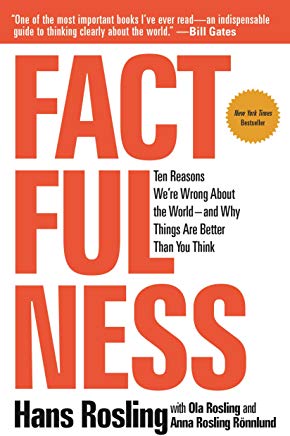

This article is an excerpt from the Shortform summary of "Factfulness" by Hans Rosling. Shortform has the world's best summaries of books you should be reading.
Like this article? Sign up for a free trial here .
Is human overpopulation going to cause massive problems in the world? Will humans reproduce until we run out of resources and room?
The simple answer is NO – human overpopulation is NOT going to be a problem. Let’s go over why, starting with why we read graphs poorly.
Why We’re Wrong About Human Overpopulation
The Straight Line Instinct is the tendency to believe that trends will continue at their current rate forever. Data and some common sense demonstrate that this is not the case:
For example, a child might grow over 35 percent in their first six months after birth, but they obviously don’t continue at this rate for the rest of their lives (otherwise, we would see a lot more seven-foot tall five-year-olds)!
The Straight Line Instinct is the cause of a lot of misplaced pessimism, particularly with regards to world human overpopulation. Magazines, newspapers, and pundits warn of an unsustainable growth in population that will diminish the planet’s food supplies, push climate change past the point of no return, and spark human conflicts as different groups compete for ever-shrinking resources.
(Shortform note: This isn’t a new source of fear. In his 1798 book An Essay on the Principle of Population, the English scholar Thomas Malthus warned that a similar human population explosion threatened to doom his generation to poverty and poverty. Based on what you’ve already learned in this summary, you know that this didn’t happen.)
The idea is widely accepted: 85 percent of surveyed “experts” in Level 4 countries overestimated human overpopulation. And, sure, if you looked at a graph like this, you might be seriously alarmed:
It looks like population is just exponentially growing with no end in sight! Once again, however, popular belief is wrong: population growth is projected to begin leveling off as we approach the end of the 21st century. In fact, the number of children in the world in 2100 is projected to be the same as today.
A Human Overpopulation Problem? Think Again
The world’s population is increasing: but it’s not increasing exponentially and the rate has already begun slowing down. World population will settle between 10 and 12 billion by 2100, a figure far lower than a straight line projection from today’s figure of 7.6 billion would have you believe.
Why will population slow down? Because the number of children will stay flat. One of the benefits of people moving out of Level 1 is that they have fewer children: and indeed, the worldwide average number of babies per woman has halved over the past 50 years. This is because people at Levels 2 and 3 (remember, this is where most of the population now lives) have better access to contraception and less of a need to have children since they don’t need more hands for subsistence agriculture.
As more people leave Level 1 for Levels 2,3, and 4, this will only continue. The trend then starts to become self-sustaining: the new generation of people born at higher income levels will have fewer children than the generation that preceded them. The expected, modest increase in population will come from these children and young adults today growing up and becoming the middle-aged and elderly of the future: there will simply be more adults.
So this is why human overpopulation is not a problem.
It’s useful to put population in some historical context. World population was approximately 5 million during the prehistoric era and stayed flat throughout antiquity and well into the modern era, due to high rates of child mortality. It only reached 1 billion around 1800 as the Industrial Revolution was dawning. Today’s population is around 7.6 billion. The majority of the increase has come only since the mid-20th century.
How the rate of increase is slowing is itself a cause for optimism. People are choosing to have fewer children because they’re rising out of poverty, gaining new economic opportunities, and for women, gaining autonomy of their reproductive choices. It’s a process driven by choice. Contrast that with how population has been held in check for most of human history: child mortality, epidemics, and famine. The new population equilibrium is much better than the old one.
Problems From Worrying About Human Overpopulation
The Straight Line Instinct, when applied specifically to the problem of overpopulation, does real harm to global welfare. If you believe that exponentially growing population is hurtling the planet toward a sustainability crisis, then you would be opposed to investing in healthcare and education services around the world. After all, wouldn’t doing so only exacerbate the problem of overpopulation?
Of course, we’ve learned that the answer to this question is “no.” Lifting people out of poverty is the humane thing to do on its own merits and actually alleviates population growth by bringing people into Levels 2,3, and 4, making them likely to have fewer children. Unjustified fears of human overpopulation have always been used to justify regressive and harmful social policy.
———End of Preview———

Like what you just read? Read the rest of the world's best summary of Hans Rosling's "Factfulness: Ten Reasons We're Wrong About the World" at Shortform . Learn the book's critical concepts in 20 minutes or less .
Here's what you'll find in our full Factfulness summary :
- Why we evolved to be negative, and why it's terrible for us today
- Surprising statistics about how people die - from plane crashes to swine flu
- How the world isn't nearly as poor as you think it is
- How to think smarter about the world, and the rest of life







I could not disagree with the conclusions of this article any more. While I agree that population growth will slow down and will not increase at the same rates it has been, to say that adding an extra 2 – 4 billion people to the planet is no big deal is craziness. Population deniers often say that people are not the problem when it comes to climate change, but carbon dioxide emissions from our current technology are. C02 emissions are just one small piece of the puzzle in the destruction of our world. More people take up more space, plain and simple, which destroys habitats for animals and plants. If you think you can just cram all these new people into eco-friendly cities, with massive high rises, it is not going to work. And our biggest individual use of resources comes from the food we eat, and I doubt people are going to stop eating any time soon. Saying that people concerned with population growth would not want to invest in healthcare is nonsense. Anyone who is here should be able to receive healthcare, the solution to population growth is reduced birthrates from individuals who decide to not selfishly have 3, 4 and more children.
So, you mean right now human population is low? not peak yet? how about urine, defecation, pollution. Last time i ate my lunch with banana leaf, paper packaging. then it turn to plastic. where were all the tree now? i can even pick a banana from road side to eat for free. do you have free land to plant now? You are just too young.
You are right. There is no overpopulation in this vast Milky Way, only inappropriate behaviour. While many resist urges, views can be influenced by animal substances, just like drugs. Habitat is fouling. Formulate and pass Ahimsa (non-violence) laws to guide behaviour by consumers, government and producers. Genetics shows all humans are relatives, mammals are kin. The habits of the past, when there were few people and plenty nature, are now reversed. Time for new rules. E.g., the rise of plant based food! Many old habits were banned to build viable community, like duels, marrying relatives, theft, drunk driving, and so on. Humans evolved not only cultivating individual excellence, but also sharing specialties and laws: competition and cooperation both. There is a population explosion in some areas: less kids perish and people live longer. But a bee without a hive is a dead bee: Ahimsa Laws! Are we a few selfish Apex Predators or many in a herbivore multicultural meritocracy? The human adventure is just beginning.
We have already exceeded the planet’s capacity to sustain the human population. So human population will only increase another 50% means there’s no problem?
Don’t agree we’ve already exceeded capacity? Then why are species going extinct at a rate never before seen since the Chicxulub impactor? Ecosystems are under extreme pressure or are already in a state of collapse.
Those 12 billion in year 2100 will be in a different world where food insecurity is the norn, pandemics run rampant, and weather swings between extremes incessantly. Sticking our heads in the sand will not make this go away.
This is just an extension of the creationists fiction known as climate change/science denial. Look to the future if you like, but what about the starvation, poverty, displaced people, disease, famine, pestilence and disenfranchisement that are just a few of the effects of overpopulation RIGHT NOW. Your moral fantasies would be a wonderful thing, but they are nothing more than just that.. fantasies. The real world is at the mercy of war, corruption, injustice, murder and suffering. Why? A number of reasons, among them (a sizeable one too is) overpopulation.
How reading 200 books has prepared you to be an expert in this field, I can’t imagine. I had read 200 non fiction books by the age of 15, yet still cannot consider myself anywhere near knowledgeable enough to pass such judgement on a matter that may decide the fate of humanity.
Come back in 25 years.